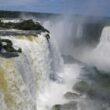It seems we cannot find what you are looking for. Perhaps searching can help.
Antarctica
Antarctica is the southernmost continent and the fifth largest in terms of area, covering about 14 million square kilometers. It is located entirely within the Antarctic Circle and is surrounded by the Southern Ocean. Although it is inhospitable to permanent human habitation, it is home to a diverse array of flora and fauna, including penguins, seals, and whales.
Antarctica is known for its extreme climate, with temperatures that can reach as low as minus 128.6°F (-89.2°C), making it the coldest place on Earth. The continent is also characterized by its vast ice sheet, which covers about 98% of its total area and holds about 70% of the world’s fresh water.
Antarctica has no permanent human residents, but it is the site of several scientific research stations, which study its unique environment and the effects of climate change on the region. The continent is protected by the Antarctic Treaty System, an international agreement signed by 54 countries that sets aside Antarctica as a scientific preserve and bans military activity on the continent.
Despite its inhospitable climate and remote location, Antarctica plays a crucial role in the global climate system and is a valuable source of information for scientists studying the Earth’s natural systems. The continent is also of growing interest for its potential mineral resources, including coal, iron, and hydrocarbons.



